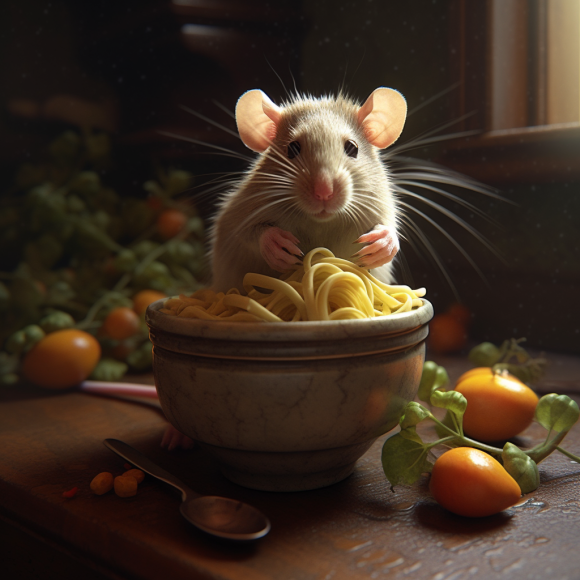As a medical animal nutritionist, I understand the vital role that a well-balanced diet plays in maintaining the health and well-being of our beloved pets. When it comes to pet rats, providing them with appropriate nutrition is of utmost importance. Rats are omnivorous creatures with specific dietary needs, and offering a variety of nutritious foods is crucial for their overall health. In this comprehensive guide, I will provide you with a detailed list of rat-friendly foods, along with tips on feeding, portion sizes, and considerations for a balanced rat diet.
Rat Diet Basics and Understanding Rat Nutritional Requirements:
- The importance of a balanced diet in meeting rats’ nutritional needs
- The ideal ratio of macronutrients (protein, carbohydrates, and fats)
- Key vitamins and minerals necessary for optimal rat health
Commercial Rat Food:
- Choosing a high-quality, nutritionally complete commercial rat food as the foundation of their diet
- Reading and understanding the ingredients list and nutritional analysis
- Transitioning gradually to new food to prevent digestive upset
Rat-Friendly Foods and Protein-Rich Foods:
- Incorporating lean sources of protein into a rat’s diet
- Suitable options such as cooked chicken, turkey, eggs, and low-fat yogurt
- Appropriate portion sizes to ensure a balanced intake of protein
Fresh Fruits:
- Offering a variety of fresh fruits as a source of vitamins and natural sugars
- Safe choices like apples, bananas, berries, and melons
- Moderation and portion control to prevent excess sugar intake
Vegetables:
- Introducing a range of vegetables to provide essential fiber and micronutrients
- Rat-friendly options such as broccoli, carrots, peas, and leafy greens
- Gradual introduction and monitoring for any adverse reactions or digestive issues
Whole Grains:
- Adding whole grains to the rat’s diet for fiber and energy
- Suitable choices like cooked brown rice, quinoa, oats, and whole wheat bread
- Ensuring portion sizes are appropriate to prevent weight gain
Healthy Fats:
- Including sources of healthy fats to support overall health and coat condition
- Suitable options such as nuts, seeds, and small amounts of nut butter
- Moderation in fat intake to prevent weight gain and maintain a balanced diet
Treats and Snacks:
- Providing occasional treats to enrich the rat’s diet and offer mental stimulation
- Rat-safe treats like small pieces of unsalted popcorn, whole grain crackers, or yogurt drops
- Limiting treat quantities to prevent excessive calorie intake
Feeding Considerations and Tips and Fresh Water:
- Providing clean, fresh water at all times in a sipper bottle or shallow dish
- Regularly monitoring and refilling water containers to ensure hydration
Variety and Rotation:
- Offering a diverse range of foods to ensure nutritional balance and prevent monotony
- Rotating food options to keep rats interested and to prevent selective eating habits
Feeding Schedule:
- Establishing a consistent feeding schedule to regulate meal times and prevent overfeeding
- Dividing the daily food portion into two or three smaller meals to mimic natural feeding behavior
Monitoring Food Intake:
- Monitoring the rat’s food intake and adjusting portion sizes as needed to maintain a healthy weight
- Regularly checking for signs of overeating or sudden changes in appetite
Foods to Avoid and Toxic Foods:
- Identifying foods that are toxic or harmful to rats, such as chocolate, caffeine, onions, and avocados
- Understanding the potential health risks associated with these foods
High-Sugar and Processed Foods:
- Limiting or avoiding sugary and processed foods, including candies, sugary cereals, and high-fat snacks
- Recognizing the negative impact of these foods on rat health
Foods with Small Parts or Choking Hazards:
- Avoiding foods with small parts, seeds, or pits that pose a choking hazard, such as cherries or grapes
- Removing any potential hazards before offering food to rats
Providing a nutritious and well-balanced diet is essential for the health and longevity of pet rats. By incorporating a variety of rat-friendly foods, monitoring portion sizes, and ensuring a balanced intake of macronutrients and micronutrients, you can promote optimal health for your furry friends. Remember, each rat is unique, and dietary preferences may vary. It’s important to observe their individual needs and make adjustments accordingly. With a commitment to their nutrition and well-being, you can provide your pet rats with a healthy and satisfying diet that supports their overall health and happiness.
